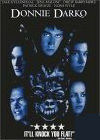|
May 2005
Don't Be Afraid of the Darko
Media Commentary By John Kenneth Muir
 I'm a bit late jumping on this particular bandwagon, but I wanted to use this month's space atFar Sector SFFHto belatedly sing the praises of a film I saw for the first time on DVD late last year, Donnie Darko (2001). It's the feature film debut of a young talent named Richard Kelly, and has been described widely as a "cult movie," whatever that means... I'm a bit late jumping on this particular bandwagon, but I wanted to use this month's space atFar Sector SFFHto belatedly sing the praises of a film I saw for the first time on DVD late last year, Donnie Darko (2001). It's the feature film debut of a young talent named Richard Kelly, and has been described widely as a "cult movie," whatever that means...
Shot on a budget of under five million dollars in twenty-eight days during the summer of 2000, this odd little work of art tanked at Sundance, bombed in its theatrical release (shortly after 9/11), and didn't even garner positive reviews from mainstream critics. But then there was an abrupt turnaround of fortune, and when the film arrived on DVD, word-of-mouth began to grow. Exponentially. Now, some four years later, Kelly's Donnie Darko has tallied more than ten million dollars on the secondary market, and also garnered a new director's cut, freshly minted on DVD in 2005.
Donnie Darko recounts the last days of a lad named--you guessed it--Donnie Darko, played with extraordinary sensitivity by Jake Gyllenhaal (The Day After Tomorrow [2004]). Donnie's a misfit and outsider at his high school, tanked up on anti-depressants prescribed by his psychologist, played by Katharine Ross (The Stepford Wives [1975]), and a general nuisance to his middle-class suburbanite parents. It's the last days of 1988, right before the general election battle between Michael Dukakis and George Bush, Sr., and Donnie is increasingly feeling disconnected from reality.
Then, one night when Donnie is out on a mountainside sleepwalking, a jet's massive cylindrical engine falls from the sky and crashes through the roof of his house, obliterating his bedroom. Had he been home, he would have been killed instantly. But this accident is a mystery for another reason. Nobody, including FAA officials, can trace the origin of this dive bomb. No plane has reported losing an engine, so this object seems to have fallen from the sky from...nowhere.
And here's where the movie gets really interesting...
After the accident, Donnie stops taking his drugs and begins to experience visions of a creature called Frank, a tall man in a Bunny costume and frightening silver mask. In distorted (and disturbing) voice, Frank reveals to Donnie that the world is going to end in twenty-eight days, unless Donnie can prevent it. For the next several weeks, Donnie attempts just that, assembling the pieces of a strange mystery involving an old lady, an obscure book about time travel, the creation of an alternate "pocket" universe, and most importantly, fate itself. Along the way he falls in love with a classmate, unmasks a local pedophile, and also comes to understand and accept his place in the universe.
If the preceding plot description makes Donnie Darko sound weird, that's an accurate perception. But the film is also brilliant in an off-the-wall fashion, evoking feelings about the alone-ness of adolescence, the vagaries of destiny, and much, much more. A careful viewing reveals how all the characters in Donnie's post-accident world are unwittingly pursuing a certain agenda, one that will guide him to a fateful decision, and I've ever seen the concepts of time travel and alternate universes treated in such an involving, and oblique way.
Donnie Darko concerns two worlds--the "real" world, and one that exists for twenty-eight days following the jet accident. Only one world can survive, and so all kinds of questions arise. Can a love in one universe be remembered in another? What is worth dying for in this--or any--reality? Is heroism unrecognized still heroism? And more to the point, if a universe requires a certain "sacrifice" to continue existing, will said universe do anything to ensure that sacrifice? Will it cause people to fall in love who might not have fallen in love before? Can it make the right people say the right things at the right moments?
These questions lead us to deeper ones, and Donnie Darko encourages viewers to dig deep below the surface of its text. Is our reality dictated by laws we don't understand or recognize? Are we, like cells in a human body, acting according to some laws of physics that we, as individual organisms, can't detect? Do we stubbornly hew to the belief in free will, when in fact - when push comes to shove - we are governed by mechanisms outside our perception?
I also appreciate how Donnie symbolizes a kind of fin de siecle Holden Caulfield, that immortal hero from Catcher in the Rye. Like his literary counterpart, Donnie's job is to shepherd the children to safety, and actually the entire human race too. Again, this reminds me of the 1988 Presidential Election, which is debated by Donnie's family during the film (his sister is voting for Dukakis over the objections of his parents). Donnie's mother even asks if they think Dukakis can "protect" them, another reference to Holden and his job as a guardian of children.
So does Donnie's final and courageous act in the film save the universe, and thereby assure the ascent of George Bush? Which then leads, ultimately, to the ascent of George W. Bush? Remember, this film was made in 2000, as the election between Gore and Bush was heating up. Is the message of this film that Bush is the one who can protect us? Or ironically, that perhaps it really should have been the "competent" (not ideological) Dukakis who won. He was up by seventeen points in the summer of 1988 after eight years of incompetent leadership from Ronald Reagan and the Republican party, and many people were baffled and surprised that Bush took the Presidency. In saving the universe from one doomsday, has Donnie merely set in motion another? A time bomb named "Dubya" waiting to explode?
All these concepts orbit Donnie Darko, but the film resonates so strongly because on its most basic level it focuses on the universal adolescent dread of approaching doomsday. When I was growing up in the 'Eighties (I was roughly the same age as Donnie was in '88), I always feared that nuclear war was just around the corner. I think many kids my age did. Of course, it wasn't, and mankind finessed his way out of annihilation.
But what about today, in 2005? Is doomsday coming around that corner yet again, in an age much more dangerous than the eighties ever were? In an age when our leaders seem much less...stable, and actually seek Armageddon as their final reward for personal religious convictions? Looking objectively at our world now, post 9/11, our fears of destruction may be valid--and who, we wonder, will play Holden Caulfield or Donnie Darko to protect us? Was Dukakis that man in 1988, and are we living on borrowed time because he didn't become President, because his loss gave rise to the dynasty of Bush?
I have no idea. But see Donnie Darko anyway. It's a compelling and thoughtful film for reasons difficult to rationally elucidate. It treads on dream imagery that casts a spell and seems to soak right through our eyes into our subconscious. A cult movie, indeed.
|




